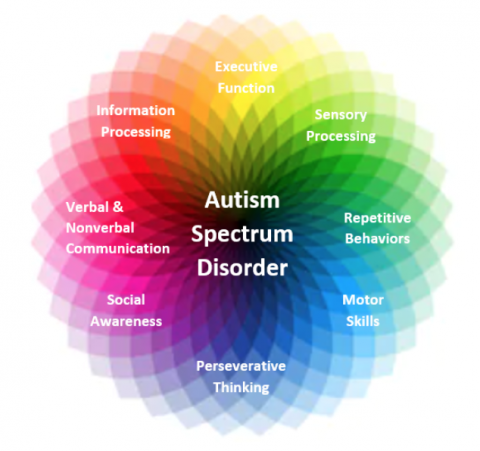Comprehending Autism: A Comprehensive Guide to Symptoms and indicators
Autism Range Condition (ASD) incorporates a variety of attributes that can significantly affect a person's social interactions and day-to-day performance. Identifying the indications and signs and symptoms, such as challenges with eye contact, social communication problems, and sensory level of sensitivities, is essential for very early intervention. Understanding these nuances not only help caretakers and instructors in giving ideal assistance yet likewise promotes a more inclusive atmosphere for individuals with ASD. As we check out the complexities of autism, it ends up being vital to take into consideration how these indicators materialize in different ways throughout the range and what ramifications they hold for reliable treatment approaches.
Introduction of Autism Range Problem
Specifying Autism Range Problem (ASD) includes identifying it as a complex neurodevelopmental condition defined by a series of obstacles in social interaction, communication, and behavioral patterns. The term "range" mirrors the wide irregularity in signs and symptoms and their seriousness, which can differ considerably from one individual to one more. ASD usually manifests in very early childhood, although some individuals may not obtain a medical diagnosis until later on in life.
Factors affecting the development of ASD include hereditary tendencies and environmental factors, although the exact reasons continue to be under examination. Diagnosis typically relies upon behavioral assessments, as there are no clear-cut medical examinations for ASD. Early intervention is crucial and can significantly boost results, concentrating on enhancing communication abilities, social interactions, and adaptive behaviors.
People with ASD might likewise show special staminas, such as outstanding attention to detail or details areas of knowledge. Understanding the complex nature of ASD is necessary for promoting an inclusive atmosphere that fits neurodiversity. Proceeded study is important for establishing reliable interventions and support systems, allowing individuals with ASD to prosper and meet their potential within culture.
Usual Signs of Autism
Recognizing the common indications of Autism Spectrum Problem (ASD) is vital for early recognition and intervention. These signs can vary widely in intensity and discussion, however particular features are frequently observed in people with ASD.
One of the most common indications is a marked difficulty in maintaining and developing eye call. Individuals may additionally display restricted passion in social communications and reveal a choice for singular play. Repetitive actions, such as hand-flapping, shaking, or rotating things, often emerge early in childhood years. Furthermore, some youngsters may develop stringent regimens and end up being distressed if these routines are interfered with.
Sensory sensitivities are likewise typical; people may underreact or panic to sensory stimulations, such as structures, lights, or noises. autism. Language development can be atypical, with some youngsters displaying delayed speech or using language in unusual methods, including echolalia-- duplicating sentences or expressions listened to in other places
It is vital to note that not every person with ASD will certainly present all these signs, and the degree of these behaviors can differ considerably. Early acknowledgment permits for prompt assistance and resources, boosting the quality of life for those on the range.
Social Interaction Challenges
Social interaction challenges are a trademark of Autism Range Problem (ASD), affecting an individual's ability to engage properly with others. These troubles can materialize in numerous means, consisting of difficulties in starting and keeping conversations, comprehending social signs, and reacting suitably in social interactions.
Individuals with ASD may have problem with nonverbal interaction, such as eye call, face expressions, and body movement. This can bring about misconceptions, as their communicative intent may not be appropriately interpreted by others. Furthermore, they might discover it difficult to grasp the nuances of tone and context, which are essential for reliable communication.
In team setups, individuals with ASD might feel overloaded and may not understand just how to join in discussions (autism). They could also display atypical conversational patterns, such as monologuing concerning specific passions without acknowledging social reciprocity
In addition, these challenges can lead to social isolation or difficulties in forming relationships, as peers may misinterpret their habits or communication style. Recognizing these social interaction obstacles is crucial for promoting supportive environments address that advertise social abilities development and enhance the quality of interactions for individuals on the autism spectrum.
Sensory Actions and level of sensitivities
Several people with Autism Spectrum Condition (ASD) experience enhanced sensory level of sensitivities that can substantially affect their everyday lives. An individual with ASD might locate daily sounds, such as a vacuum cleaner or crowded environments, overwhelmingly distressing, leading to anxiety or crises.
Sensory handling differences in people with ASD can additionally impact their ability to take part in regular activities and social interactions. A child who is delicate to touch might resist physical love or stay clear of particular clothing materials. Additionally, a choice for sure textures or tastes can restrict nutritional alternatives and produce obstacles during nourishments.
Recognizing these sensory level of sensitivities is essential for acknowledging the special experiences of individuals with ASD. Recognition of their sensory accounts can promote better interaction and support methods, developing an environment that fits their demands and improves their top quality of life. Inevitably, acknowledging sensory level of sensitivities is a vital element of comprehending the wider spectrum of autism.

Sustaining Individuals With Autism
Effective support for individuals with Autism Range Condition (ASD) is vital for enhancing their overall health and fostering independence. Assistance techniques need to be tailored to fulfill the one-of-a-kind needs of each person, considering their staminas and challenges.

Social abilities training can also play index a crucial role. autism. Involving individuals in team tasks or role-playing circumstances can enhance their capacity to browse social communications. Furthermore, it is important to inform relative, webpage caregivers, and peers about ASD to promote a comprehensive and encouraging neighborhood
Conclusion
Finally, a detailed understanding of Autism Spectrum Problem is necessary for identifying its signs and indications. Early recognition of typical attributes, such as social interaction obstacles and sensory level of sensitivities, allows caregivers and teachers to carry out effective interventions. By fostering improved interaction and social abilities, people with autism can navigate their settings extra successfully. Eventually, boosted awareness and assistance can significantly improve the top quality of life for those impacted by ASD.
Autism Range Condition (ASD) incorporates a wide range of features that can considerably impact an individual's social interactions and everyday performance.Individuals with ASD might have a hard time with nonverbal communication, such as eye call, facial expressions, and body language.Several people with Autism Spectrum Disorder (ASD) experience heightened sensory level of sensitivities that can significantly affect their daily lives.Sensory handling distinctions in people with ASD can additionally influence their capability to involve in social interactions and regular activities.Recognizing these sensory sensitivities is important for acknowledging the special experiences of people with ASD.